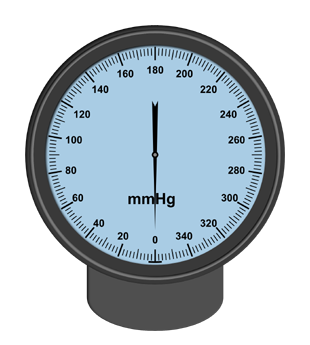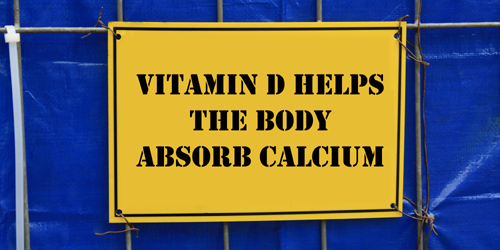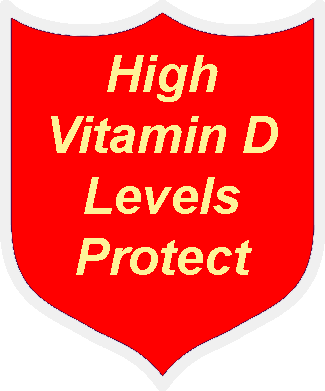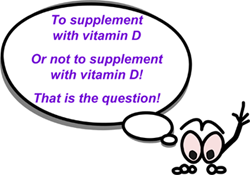Low Vitamin D Linked To Disease: 2 Big Studies
LOW VITAMIN D LINKED TO DISEASE IN TWO BIG STUDIES (ISSUE 124)
by Diane Gold
NOTE FROM PUBLISHER
A version of this article appeared in The New York Times. Asterisks mark changes from original article.
___
By Anahad O’Connor
New research has found that lower vitamin D levels were associated with illness, but didn’t show whether they were a cause.
 People with low vitamin D levels are more likely to die from cancer and heart disease and to suffer from other illnesses, scientists reported in two large studies published on Tuesday.
People with low vitamin D levels are more likely to die from cancer and heart disease and to suffer from other illnesses, scientists reported in two large studies published on Tuesday.
The new research suggests strongly that blood levels of vitamin D are a good barometer of overall health. But it does not resolve the question of whether low levels are a cause of disease or simply an indicator of behaviors that contribute to poor health, like a sedentary lifestyle, smoking and a diet heavy in processed and unhealthful foods.
Nicknamed the sunshine nutrient, vitamin D is produced in the body when the skin is exposed to sunlight….* And blood levels of it can be lowered by smoking, obesity and inflammation.
 Vitamin D helps the body absorb calcium and is an important part of the immune system. Receptors for the vitamin and related enzymes are found throughout cells and tissues of the body, suggesting it may be vital to many physiological functions, said Dr. Oscar H. Franco, a professor of preventive medicine at Erasmus Medical Center in the Netherlands and an author of one of the new studies, which appeared in the journal BMJ [April 1, 2014.]*
Vitamin D helps the body absorb calcium and is an important part of the immune system. Receptors for the vitamin and related enzymes are found throughout cells and tissues of the body, suggesting it may be vital to many physiological functions, said Dr. Oscar H. Franco, a professor of preventive medicine at Erasmus Medical Center in the Netherlands and an author of one of the new studies, which appeared in the journal BMJ [April 1, 2014.]*
“It has effects at the genetic level, and it affects cardiovascular health and bone health,” he said. “There are different hypotheses for the factors that vitamin D regulates, from genes to inflammation. That’s the reason vitamin D seems so promising.”
The two studies were meta-analyses that included data on more than a million people. They included observational findings on the relationship between disease and blood levels of vitamin D. The researchers also reviewed evidence from randomized controlled trials — the gold standard in scientific research — that assessed whether taking vitamin D daily was beneficial.
Dr. Franco and his co-authors — a team of scientists at Harvard, Oxford and other universities — found persuasive evidence that vitamin D protects against major diseases. Adults with lower levels of the vitamin in their systems had a 35 percent increased risk of death from heart disease, 14 percent greater likelihood of death from cancer, and a greater mortality risk overall.
When the researchers looked at supplement use, they found no benefit to taking vitamin D2. But middle-aged and older adults who took another form, vitamin D3 …* produced in response to sunlight — had an 11 percent reduction in mortality from all causes, compared to adults who did not. In the United States and Europe, it is estimated that more than two-thirds of the population is deficient in vitamin D. In their paper, Dr. Franco and his colleagues calculated that roughly 13 percent of all deaths in the United States, and 9 percent in Europe, could be attributed to low vitamin D levels.
“We are talking about a large part of the population being affected by this,” he said. “Vitamin D could be a good route to prevent mortality from cardiovascular disease and other causes of mortality.”
In the second study, also published in BMJ, a team of researchers at Stanford and several universities in Europe presented a more nuanced view of vitamin D.
They concluded there was “suggestive evidence” that high vitamin D levels protect against diabetes, stroke, hypertension and a host of other illnesses. But they also said there was no “highly convincing” evidence that vitamin D pills affected any of the outcomes they examined.
 “Based on what we found, we cannot recommend widespread supplementation,” said Evropi Theodoratou, an author of the study and research fellow at the Center for Population Health Sciences at the University of Edinburgh. The second study also looked at bone health. While Vitamin D had long been believed to help prevent osteoporosis fractures from falls, clinical trials in recent years have challenged the idea. The study also found no evidence to support that assumption.
“Based on what we found, we cannot recommend widespread supplementation,” said Evropi Theodoratou, an author of the study and research fellow at the Center for Population Health Sciences at the University of Edinburgh. The second study also looked at bone health. While Vitamin D had long been believed to help prevent osteoporosis fractures from falls, clinical trials in recent years have challenged the idea. The study also found no evidence to support that assumption.
“Vitamin D might not be as essential as previously thought in maintaining bone mineral density,” Dr. Theodoratou and her colleagues wrote.
 Dr. Theodoratou was not alone in suggesting people hold off on taking vitamin D supplements for now. Even though Dr. Franco found them to be beneficial, he said that more research was needed to show what levels are best. Instead of taking pills, people could improve their vitamin D levels with an adequate diet and 30 minutes of sunlight twice a week, he said.
Dr. Theodoratou was not alone in suggesting people hold off on taking vitamin D supplements for now. Even though Dr. Franco found them to be beneficial, he said that more research was needed to show what levels are best. Instead of taking pills, people could improve their vitamin D levels with an adequate diet and 30 minutes of sunlight twice a week, he said.
“The most important factors in obtaining vitamin D are going out and doing some exercise and following a healthy diet,” he added.
And in an editorial that accompanied the studies in BMJ, Paul Welsh and Dr. Naveed Sattar of the British Heart Foundation’s Glasgow Cardiovascular Research Center pointed out that previous research “extolled the virtues of antioxidant vitamins only for major trials of vitamins E and C and beta carotene to show null, or even some harmful, effects of supplementation.”
They said vitamin D pills should not be recommended widely until clinical trials that are underway shed more light on the benefits and potential side effects.
But Duffy MacKay, a spokesman for the Council for Responsible Nutrition, a supplement industry trade group, said that vitamin D is not easily obtained through food alone, and noted that exposure to sunlight has its dangers.
He said he agreed with Dr. Franco that more research was needed to identify “an optimal dose and duration” of vitamin D.
 “But there is enough positive research currently to indicate that people should be supplementing with vitamin D for a variety of positive health outcomes,” he added.
“But there is enough positive research currently to indicate that people should be supplementing with vitamin D for a variety of positive health outcomes,” he added.
CONCLUSION FROM PUBLISHER
Although there are many studies with conflicting opinions about vitamin D levels and disease or supplementation and absorption, we must be open enough to change our minds when we get new information. This goes for all topics.
We can hear the debate and decide for ourselves whether the studies we hear about were stringent enough, had enough participants, were controlled by pharmaceutical industry purpose and measured what they set out to measure. This will lead us to better understanding of vitamin D and how it affects our health.
ACTION STEP
Spend some active time outside where it is bright. If you’re not used to the sun, take it slowly. 10 minutes several times a week is a great beginning amount of time. Sunscreen is known to block vitamin D absorption, so 5 minutes at a time works if you are very fair skinned.
![]()
This article has been edited. You can see the original at The New York Times Wellness Blog, Anahad O’Connor, April 1, 2014.
Anahad O’Connor is a staff writer for The New York Times as well as an author and avid investigative journalist. See more about him on our Experts page.
![]()
If you wish to share your story, please hit reply in your email program to be contacted.
![]()
FEEDBACK
We value your feedback very much.
Please leave a comment.
Please LIKE us on the website and at
WarriorsOfWeight on Facebook.
You can also follow us on Twitter @warriorsoweight.
Thanks.
![]()
DIANE GOLD, PUBLISHER AND AUTHOR
Diane Gold, Founder of Warriors of Weight, Turning Habits Into Health, is a mentor in tai chi, kung fu and meditation, a music, fitness and stress expert, dedicated mom, studying plant-based nutrition and habit change.
She always enjoys new information about science and the science of nutrition. She says,
“Be diligent in your search for eating well. How we treat our bodies matters. Read a lot so that the mind stays open to varying opinions. Believe many, rather than following the first thing you hear. Discuss what you read and share the knowledge you have. Enjoy it when the information changes.”
![]()







